- Home
- Robert B. Parker
Promised Land Page 4
Promised Land Read online
Page 4
“Yeah. Christ, if I hadn’t she’d have dropped her pants right here in the bar.”
“You already said that.”
“Well, it’s goddamned so. Jack, you better believe it.”
Eddie dropped another shot of bar whiskey and sipped at a second beer chaser that Rudy had brought without being asked.
“Did you know her before she picked you up?”
“Hell, I didn’t pick her up, she picked me up. I was just sitting here looking over the field and she came right over and sat down and started talking to me.”
“Well, then, did you know her before she picked you up?”
Eddie shrugged, and gestured his shot glass at Rudy. “I’d seen her around. I didn’t really know her, but I knew she was around, you know, that she was easy tail if you were looking.” Eddie drank his shot as soon as Rudy poured it, and when he put the glass back on the bar Rudy filled it again.
“She been on the market long,” I said. Me and Eddie were really rapping now, just a couple of good old boys, talking shop. Eddie drained his beer chaser, burped loudly, laughed at his burp. Maybe I wouldn’t be able to dazzle him with my sophistication.
“On the market? Oh, you mean, yeah, I get you. No, not so long. I don’t think I noticed her or heard much about her before this year. Maybe after Christmas, guy I know banged her. That’s about the first I heard.” His tongue was getting a little thick and his S’s were getting slushy.
“Was your parting friendly?” I said.
“Huh?”
“What was it like in the morning when you woke up and said goodby to each other?”
“You’re a nosy bastard,” he said and looked away, staring at the two college girls across the room.
“People have said that.”
“Well, I’m saying it.”
“Yes, you are. And beautifully.”
Eddie turned his stare at me. “What are you, a wise guy?”
“People have said that too.”
“Well, I don’t like wise guys.”
“I sort of figured you wouldn’t.”
“So get lost or I’ll knock you on your ass.”
“AndI sort of figured you’d put it just that way.”
“You looking for trouble. Jack, I’m just the man to give it to you.”
“I got all the trouble I need,” I said. “What I’m looking for is information. What kind of mood was Pam Shepard in the morning after she’d been all over you?”
Eddie got off the barstool and stood in front of me. “I’m telling you for the last time. Get lost or get hurt.” Rudy started drifting toward the phone. I checked the amount of room in front of the bar. Maybe ten feet. Enough. I said to Rudy, “It’s okay. No one will get hurt. I’m just going to show him something.”
I stood up. “Tubbo,” I said to Eddie, “if you make me, I can put you in the hospital, and I will. But you probably don’t believe me, so I’ll have to prove it. Go ahead. Take your shot.”
He took it, a right-hand punch that missed my head when I moved. He followed up with a left that missed by about the same margin when I moved the other way.
“You’ll last about two minutes doing that,” I said. He rushed at me and I rolled around him. “Meanwhile,” I said, “ifI wanted to I could be hitting you here.” I tapped him openhanded on the right cheek very fast three times. He swung again and I stepped a little inside the punch and caught it on my left forearm. I caught the second one on my right. “Or here,” I said and patted him rat-a-tat with both hands on each cheek. The way a grandma pats a child. I stepped back away from him. He was already starting to breathe hard. “Some shape you’re in, kid. In another minute you won’t be able to get your arms up.”
“Back off, Eddie,” Rudy said from behind the bar. “He’s a pro, for crissake, he’ll kill you if you keep shoving him.”
“I’ll shove the son of a bitch,” Eddie said and made a grab at me. I moved a step to my right and put a left hook into his stomach. Hard. His breath came out in a hoarse grunt and he sat down suddenly. His face blank, the wind knocked out of him, fighting to get his breath. “Or there,” I said.
Eddie got his breath partially back and climbed to his feet. Without looking at anyone he headed, wobbly legged, for the men’s room. Rudy said to me, “You got some good punch there.”
“It’s because my heart is pure,” I said.
“I hope he don’t puke all over the floor in there,” Rudy said.
The other people in the room, quiet while the trouble had flared, began to talk again. The two college girls got up and left, their drinks unfinished, their mothers’ parting fears confirmed. Eddie came back from the men’s room, his face pale and wet where he’d probably splashed it with water.
“The boilermakers will do it to you,” I said. “Slow you down and tear up your stomach.”
“I know guys could take you,” Eddie said. There was no starch in his voice when he said it and he didn’t look at me.
“I do too,” I said. “AndI know guys who can take them. After a while counting doesn’t make much sense. You just got into something I know more about than you do.”
Eddie hiccupped.
“Tell me about how you left each other in the morning,” I said. We were sitting at the bar again.
“What if I don’t?” Eddie was looking at the small area of bar top encircled by his forearms.
“Then you don’t. I don’t plan to keep punching you in the stomach.”
“We woke up in the morning and I wanted to go one more time, you know, sort of a farewell pop, and she wouldn’t let me touch her. Called me a pig. Said if I touched her she’d kill me. Said I made her sick. That wasn’t what she said before. We were screwing our brains out half the night and next morning she calls me a pig. Well, I don’t need that shit, you know? So I belted her and walked out. Last I seen her she was lying on her back on the bed crying loud as a bastard. Just staring up at the ceiling and screaming crying.” He shook his head. “What a weird bitch,” he said. “I mean five hours before she was screwing her brains out for me.”
I said, “Thanks, Eddie.” I took a twenty-dollar bill out of my wallet and put it on the bar. “Take his out too, Rudy, and keep what’s left.”
When I left, Eddie was still looking at the bar top inside his forearms.
Chapter 7
I had lamb stew and a bottle of Burgundy for supper and then headed into my room to start on the box of bills and letters Shepard had given me. I went through the personal mail first and found it sparse and unenlightening. Most people throw away personal, mail that would be enlightening, I’d found. I got all the phone bills together and made a list of the phone numbers and charted them for frequency. Then I cross-charted them for locations. A real sleuth, sitting on the motel bed in my shorts shuffling names and numbers. There were three calls in the past month to a number in New Bedford, the rest were local. I assembled all the gasoline credit-card receipts. She had bought gasoline twice that month in New Bedford. The rest were around home. I catalogued the other credit-card receipts. There were three charges from a New Bedford restaurant. All for more than thirty dollars. The other charges were local. It was almost midnight when I got through all of the papers. I made a note of the phone number called in New Bedford, of the New Bedford restaurant and the name of the gas station in New Bedford, then I stuffed all the paper back in the carton, put the carton in the closet and went to bed. I spent most of the night dreaming about phone bills and charge receipts and woke up in the morning feeling like Bartleby the Scrivener.
I had room service bring me coffee and corn muffins and at 9:05 put in a call to the telephone business office in New Bedford. A service rep answered.
“Hi,”I said. “Ed MacIntyre at the Back Bay business office in Boston. I need a listing for telephone number 555-3688, please.”
“Yes, Mr. Maclntyre, one moment please … that listing is Alexander, Rose. Three Centre Street, in New Bedford.”
I complimented her on the speed w
ith which she found the listing, implied perhaps a word dropped to the district manager down there, said goodby with smily pleasant overtones in my voice and hung up. Flawless.
I showered and shaved and got dressed. Six hours of paper shuffling had led me to a surmise that the Hyannis cops had begun by checking the bus terminal. She was in New Bedford. But I had an address, maybe not for her, but for someone. It pays to do business with your local gumshoe. Personalized service.
The drive to New Bedford up Route 6 was forty-five miles and took about an hour through small towns like Wareham and Onset, Marion and Mattapoisett. Over the bridge from Fairhaven across the interflow of the harbor and the Acushnet River, New Bedford rose steeply from the docks. Or what was left of it. The hillside from the bridge to the crest looked like newsreel footage of the Warsaw ghetto. Much of the center of the city had been demolished and urban renewal was in full cry. Purchase Street, one of the main streets the last time I’d been in New Bedford, was now a pedestrian mall. I drove around aimlessly in the bulldozed wasteland for perhaps ten minutes before I pulled off into a rutted parking area and stopped. I got out, opened the trunk of my car and got out a street directory for Massachusetts.
Centre Street was down back of the Whaling Museum. I knew the hill and turned left past the public library. Out front they still had the heroic statue of the harpooner in the whaleboat. A dead whale or a stove boat. The choices then were simple, if drastic. I turned left down the hill toward the water, then onto Johnny Cake Hill and parked near the Whaling Museum, in front of the Seaman’s Bethel.
I checked my street map again and walked around the Whaling Museum to the street behind it and looked and there was Centre Street. It was a short street, no more than four or five buildings long, and it ran from North Water Street, behind the museum, to Front Street, which paralleled the water. It was an old street, weedy and dank. Number three was a narrow two story building with siding of gray asbestos shingles and a crumbly looking red brick chimney in the center of the roof. The roof shingles were old and dappled in various shades as though someone had patched it periodically with what he had at hand. It needed more patching. There was worn green paint on the trim here and there and the front door on the right side of the building face was painted red. It had the quality of an old whore wearing lipstick.
I hoped she wasn’t in there. I wanted to find her but I hated to think of her coming from the big sunny house in Hyannis to burrow in rat’s alley. What to do now? No one knew me, neither Rose Alexander or Pam Shepard, nor, as far as I knew, anyone in New Bedford. In fact the number of places where I could go and remain anonymous continuously amazed me. I could enter on any pretext and look around. Or I could knock on the door and ask for Pam Shepard. The safest thing was to stand around and watch. I liked to know as much as I could before I went in where I hadn’t been before. That would take time, but I wouldn’t run the risk of scaring anyone off. I looked at my watch: 12:15. I went back up toward what was left of the business district and found a restaurant. I had fried clams and cole slaw and two bottles of beer. Then I strolled back down to Centre Street and took up station about five past one. On North Water Street a municipal crew was at work with a backhoe and some jackhammers, while several guys with shirts and ties and yellow hard hats walked around with clipboards and conferred. Nobody came down Centre Street, or up it. Nobody had anything to do with Centre Street. No evidence of life appeared at number three. I had picked up a copy of the New Bedford Standard Times on my way back from lunch and I read it while I leaned on a telephone pole on the corner of North Water and Centre. I read everything, glancing regularly over the rim of the paper to check the house. I read about a bean supper at the Congregational church in Mattapoisett, about a father-son baseball game at the junior high school field in Rochester, about a local debutante’s ball at the Wamsutta Club. I read the horoscope, the obituaries, the editorial, which took a strong stand against the incursion of Russian trawlers into local waters. I read “Dondi” and hated it. When I finished the paper, I folded it up, walked the short length of Centre Street and leaned against the doorway of an apparently empty warehouse on the corner of Centre and Front streets.
At three o’clock a wino in a gray suit, a khaki shirt and an orange flowered tie stumbled into my doorway and urinated in the other corner. When he got through I offered to brush him off and hand him a towel but he paid me no attention and stumbled off. What is your occupation, sir? I’m an outdoor men’s room attendant. I wondered if anyone had ever whizzed on Allan Pinkerton’s shoe.
At four-fifteen Pam Shepard came out of the shabby house with another woman. Pam was slim and Radcliffy looking wife a good tan and her brown hair back in a tight French twist. She was wearing a chino pantsuit that displayed a fine-looking backside. I’d have to get closer but she looked worth finding. The woman she was with was smaller and sturdier looking. Short black hair, tan corduroy jeans and a pink muslin shirt like Indira Gandhi. They headed up the street toward the museum and turned left on the Purchase Street pedestrian mall. The mall had been created by curbing across the intersection streets and had a homemade look to it. Pam Shepard and her friend went into a supermarket and I stood under the awning of a pawnshop across the street and watched them through the plate-glass window. They bought some groceries, consulting a shopping list as they went, and in about a half-hour they were back out on the street, each with a large brown paper sack in her arms. I followed them back to the house on Centre Street and watched them disappear inside. Well, at least I knew where she was. I resumed my telephone pole. The warehouse door had lost some of its appeal.
It got dark and nothing else happened, I was beginning to hope for the wino again. I was also hungry enough to eat at a Hot Shoppe. I had some thinking it over to do and while I always did that better eating, the fried clams had not sold me on New Bedford cuisine and I would probably have to sleep sometime later on anyway. So I went back and got my car and headed back for Hyannis. There was a parking ticket under the wiper but it blew off somewhere near a bowling alley in Mattapoisett.
During the ride back to Hyannis I decided that the best move would be to go back to New Bedford in the morning and talk with Pam Shepard. In a sense I’d done what I hired on for. That is, I had her located and could report that she was alive and under no duress. It should be up to Shepard to go and get her. But it didn’t go down right, giving him the address and going back to Boston. I kept thinking of Eddie Taylor’s final look at her, lying on the bed on her back screaming at the ceiling. There had been a pathetic overdressed quality to her as she came out of the shabby two-story on Centre Street. She’d had on pendant earrings.
It was nine-thirty when I got back to the motel. The dining room was still open so I went in and had six oysters and a half bottle of Chablis and a one-pound steak with Béarnaise sauce and a liter of beer. The salad had an excellent house dressing and the whole procedure was a great deal more pleasant than hanging around in a doorway with an incontinent wino. After dinner I went back to my room and caught the last three innings of the Sox game on channel six.
Chapter 8
In the morning I was up and away to New Bedford before eight. I stopped at a Dunkin’ Donuts shop for a trainingtable breakfast to go, and ate my doughnuts and drank my coffee as I headed up the Cape with the sun at my back. I hit New Bedford at commuter time and while it wasn’t that big a city its street system was so confused that the traffic jam backed up across the bridge into Fairhaven. It was nine-forty when I got out of the car and headed for the incongruous front door at 3 Centre Street. There was no doorbell and no knocker so I rapped on the red panels with my knuckles. Not too hard, the door might fold.
A big, strong-looking young woman with light brown hair in a long single braid opened the door. She had on jeans and what looked like a black leotard top. She was obviously braless, and, less noticeably, shoeless.
“Good morning,” I said, “I’d like to speak with Pam Shepard, please.”
“I’m sorry,
there’s no Pam Shepard here.”
“Will she be back soon?” I was giving her my most engaging smile. Boyish. Open. Mr. Warm.
“I don’t know any such person,” she said.
“Do you live here?” I said.
“Yes.”
“Are you Rose Alexander?”
“No.” Once I give them the engaging smile they just slobber all over me.
“Is she in?”
“Who are you?”
“I asked you first,” I said.
Her face closed down and she started to shut the door. I put my hand flat against it and held it open. She shoved harder and I held it open harder. She seemed determined.
“Madam,” I said, “if you will stop shoving that door at me, I will speak the truth to you. Even though, I do not believe you have spoken the truth to me.”
She paid no attention. She was a big woman and it was getting hard to hold the door open effortlessly.
“I stood outside this house most of yesterday and saw Pam Shepard and another woman come out, go shopping and return with groceries. The phone here is listed to Rose Alexander.” My shoulder was beginning to ache. “I will talk civilly with Pam Shepard and I won’t drag her back to her husband.”
Behind the young woman a voice said, “What the hell is going on here, Jane?”
Jane made no reply. She kept shoving at the door. The smaller, black-haired woman I’d seen with Pam Shepard yesterday appeared. I said, “Rose Alexander?” She nodded. “I need to talk with Pam Shepard,” I said.
“I don’t …” Rose Alexander started.
“You do too,” I said. “I’m a detective and I know such things: If you’ll get your Amazon to unhand the door we can talk this all out very pleasantly.”
Rose Alexander put her hand on Jane’s arm. “You’d better let him in, Jane,” she said gently. Jane stepped away from the door and glared at me. There were two bright smudges of color on her cheekbones, but no other sign of exertion. I stepped into the hall. My shoulder felt quite numb as I took my hand off the door. I wanted to rub it but was too proud. What price machismo?

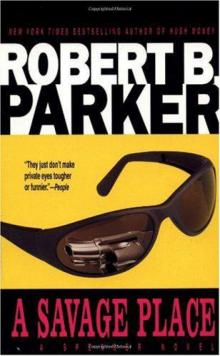 A Savage Place s-8
A Savage Place s-8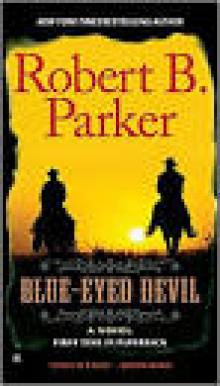 Appaloosa / Resolution / Brimstone / Blue-Eyed Devil
Appaloosa / Resolution / Brimstone / Blue-Eyed Devil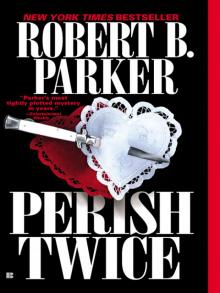 Perish Twice
Perish Twice Spare Change
Spare Change Family Honor
Family Honor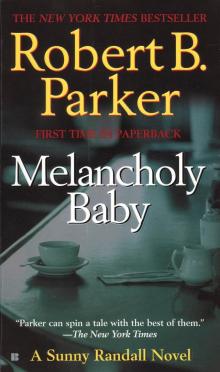 Melancholy Baby
Melancholy Baby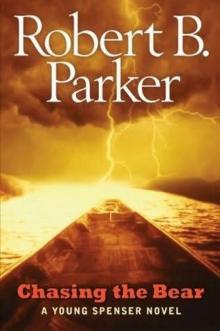 Chasing the Bear
Chasing the Bear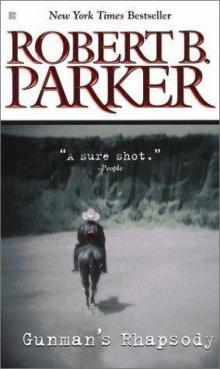 Gunman's Rhapsody
Gunman's Rhapsody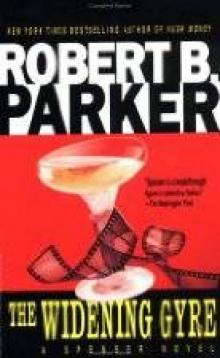 The Widening Gyre
The Widening Gyre Thin Air
Thin Air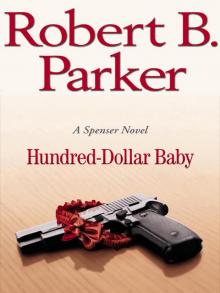 Hundred-Dollar Baby
Hundred-Dollar Baby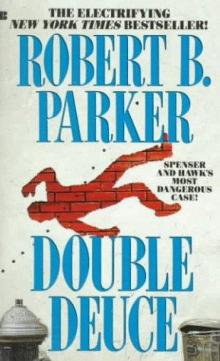 Double Deuce s-19
Double Deuce s-19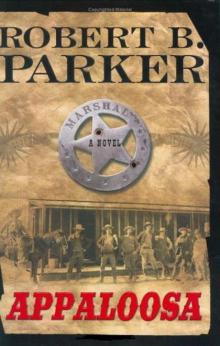 Appaloosa vcaeh-1
Appaloosa vcaeh-1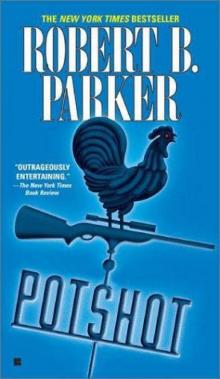 Potshot
Potshot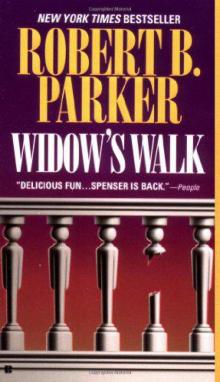 Widow’s Walk s-29
Widow’s Walk s-29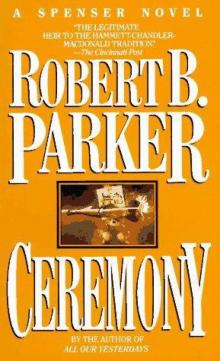 Ceremony s-9
Ceremony s-9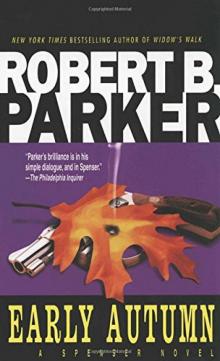 Early Autumn
Early Autumn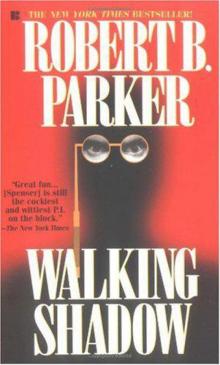 Walking Shadow s-21
Walking Shadow s-21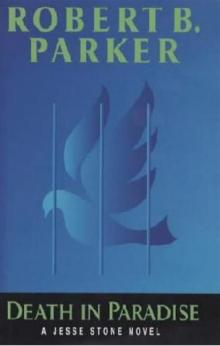 Death In Paradise js-3
Death In Paradise js-3 Shrink Rap
Shrink Rap Blue-Eyed Devil
Blue-Eyed Devil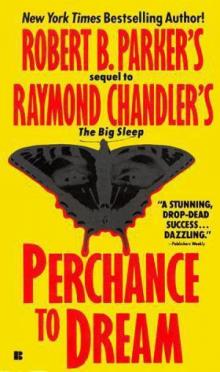 Perchance to Dream
Perchance to Dream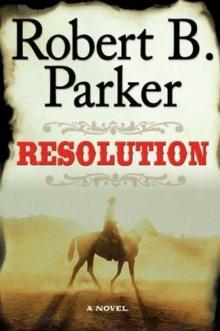 Resolution vcaeh-2
Resolution vcaeh-2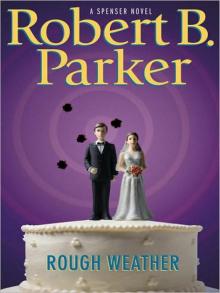 Rough Weather
Rough Weather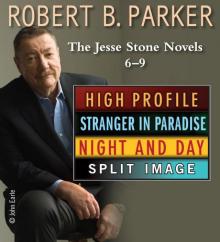 The Jesse Stone Novels 6-9
The Jesse Stone Novels 6-9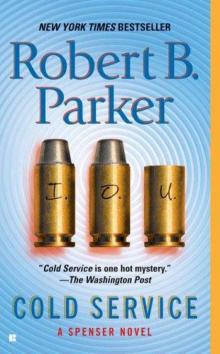 Cold Service s-32
Cold Service s-32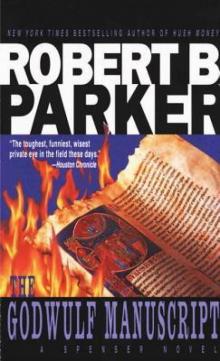 The Godwulf Manuscript
The Godwulf Manuscript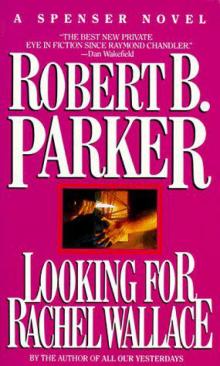 Looking for Rachel Wallace s-6
Looking for Rachel Wallace s-6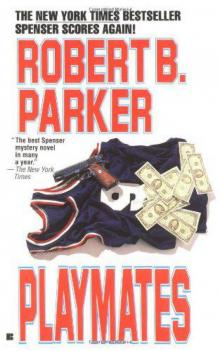 Playmates s-16
Playmates s-16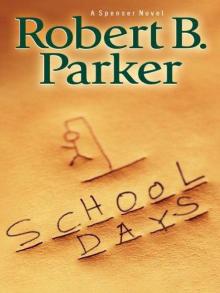 School Days s-33
School Days s-33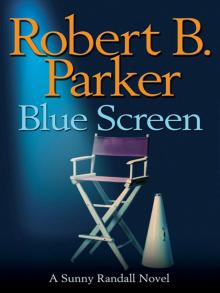 Blue Screen
Blue Screen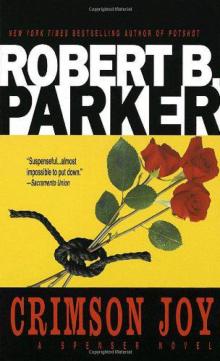 Crimson Joy
Crimson Joy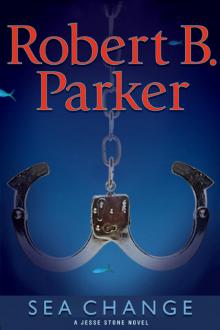 Sea Change js-5
Sea Change js-5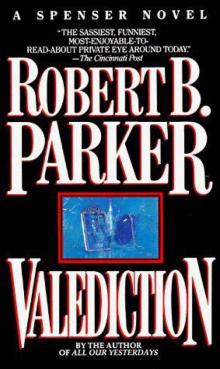 Valediction s-11
Valediction s-11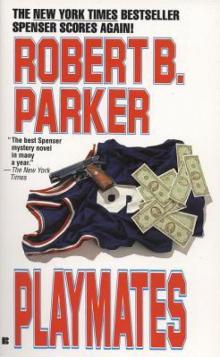 Playmates
Playmates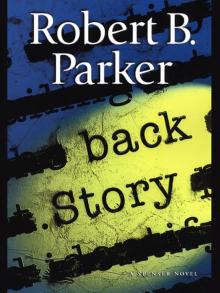 Back Story
Back Story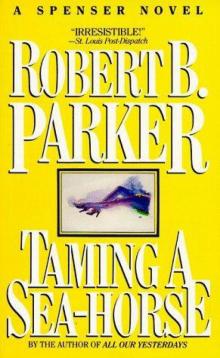 Taming a Sea Horse
Taming a Sea Horse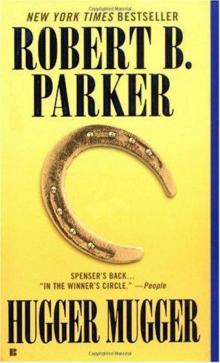 Hugger Mugger
Hugger Mugger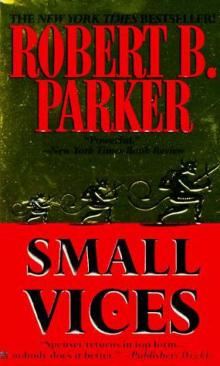 Small Vices s-24
Small Vices s-24 Silent Night: A Spenser Holiday Novel
Silent Night: A Spenser Holiday Novel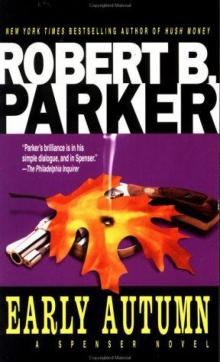 Early Autumn s-7
Early Autumn s-7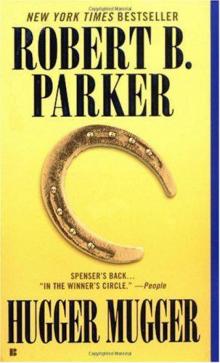 Hugger Mugger s-27
Hugger Mugger s-27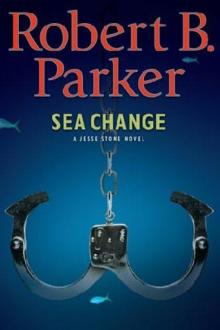 (5/10) Sea Change
(5/10) Sea Change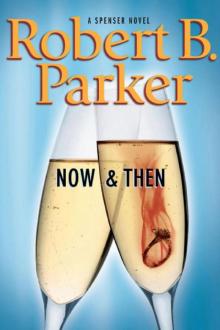 Now and Then
Now and Then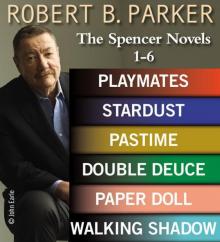 Robert B. Parker: The Spencer Novels 1?6
Robert B. Parker: The Spencer Novels 1?6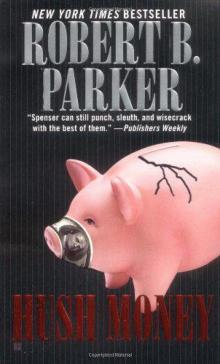 Hush Money s-26
Hush Money s-26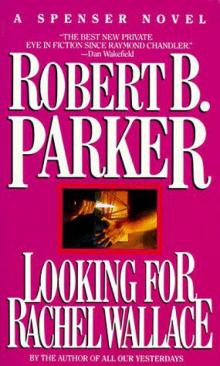 Looking for Rachel Wallace
Looking for Rachel Wallace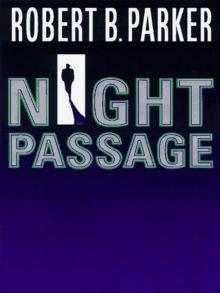 Night Passage
Night Passage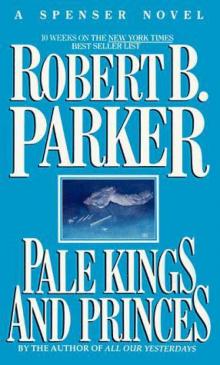 Pale Kings and Princes
Pale Kings and Princes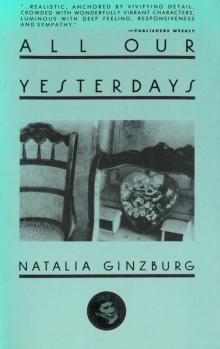 All Our Yesterdays
All Our Yesterdays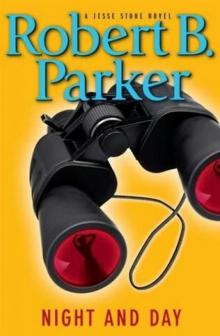 Night and Day js-8
Night and Day js-8 Stranger in Paradise js-7
Stranger in Paradise js-7 Double Play
Double Play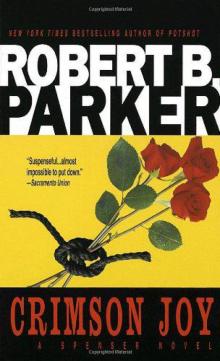 Crimson Joy s-15
Crimson Joy s-15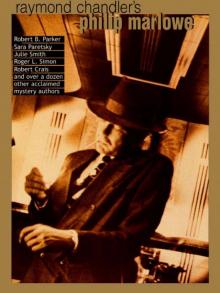 Raymond Chandler's Philip Marlowe
Raymond Chandler's Philip Marlowe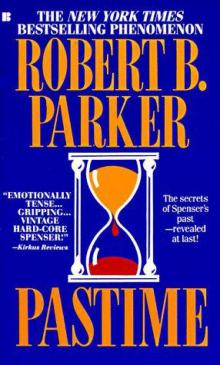 Pastime
Pastime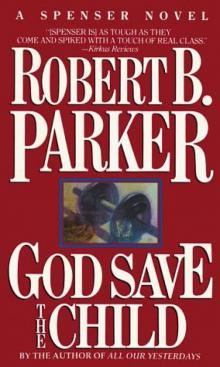 God Save the Child s-2
God Save the Child s-2 Bad Business
Bad Business Trouble in Paradise js-2
Trouble in Paradise js-2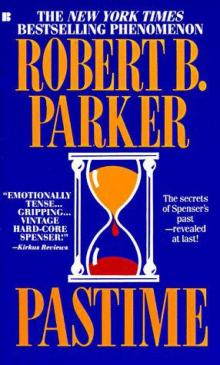 Pastime s-18
Pastime s-18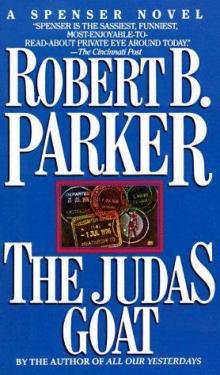 The Judas Goat s-5
The Judas Goat s-5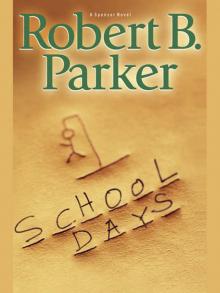 School Days
School Days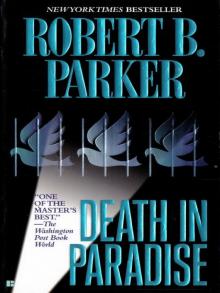 Death In Paradise
Death In Paradise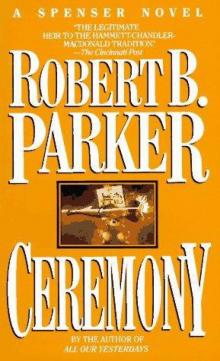 Ceremony
Ceremony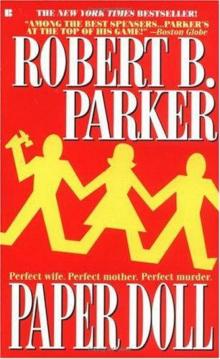 Paper Doll s-20
Paper Doll s-20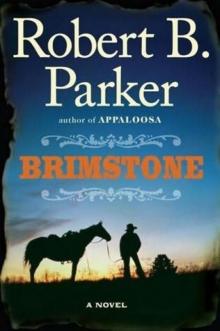 Brimstone vcaeh-3
Brimstone vcaeh-3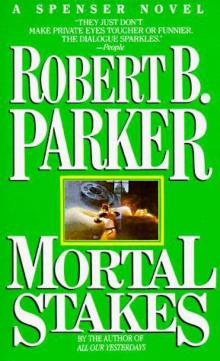 Mortal Stakes s-3
Mortal Stakes s-3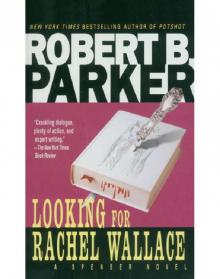 Spencer 06 - Looking for Rachel Wallace
Spencer 06 - Looking for Rachel Wallace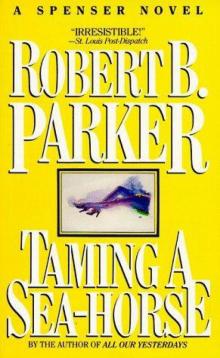 Taming a Sea Horse s-13
Taming a Sea Horse s-13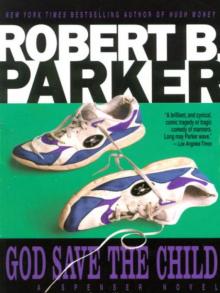 God Save the Child
God Save the Child Chance
Chance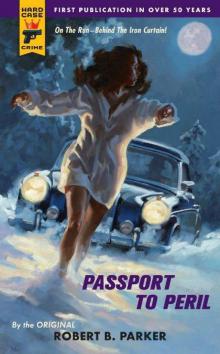 Passport To Peril hcc-57
Passport To Peril hcc-57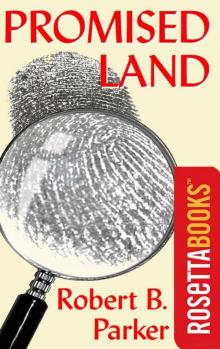 Promised Land
Promised Land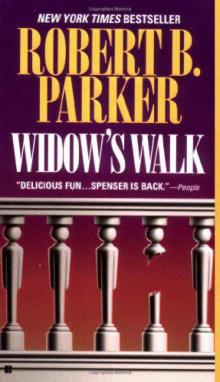 Widow’s Walk
Widow’s Walk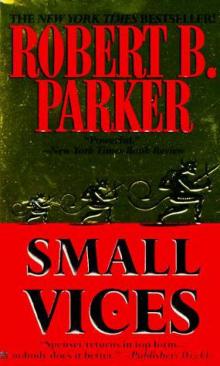 Small Vices
Small Vices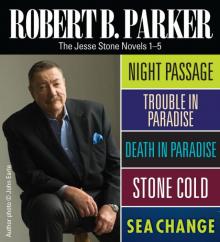 Robert B Parker: The Jesse Stone Novels 1-5
Robert B Parker: The Jesse Stone Novels 1-5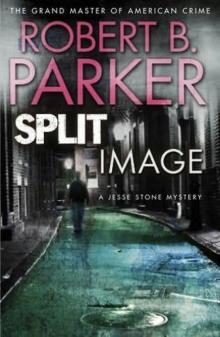 Split Image js-9
Split Image js-9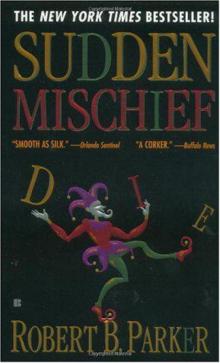 Sudden Mischief s-25
Sudden Mischief s-25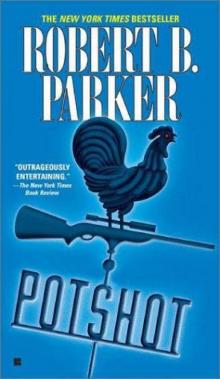 Potshot s-28
Potshot s-28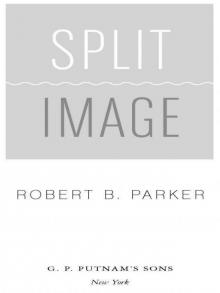 Split Image
Split Image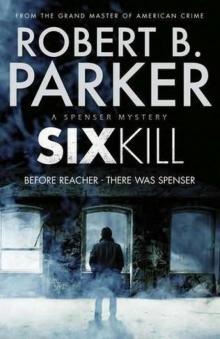 Sixkill s-40
Sixkill s-40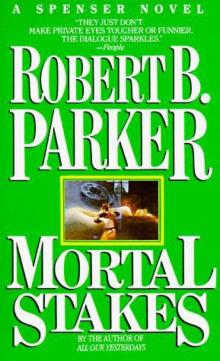 Mortal Stakes
Mortal Stakes Stardust
Stardust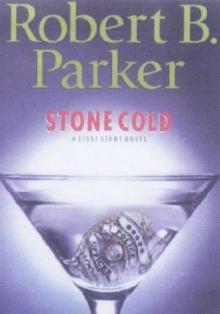 Stone Cold js-4
Stone Cold js-4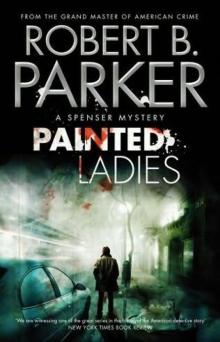 Painted Ladies s-39
Painted Ladies s-39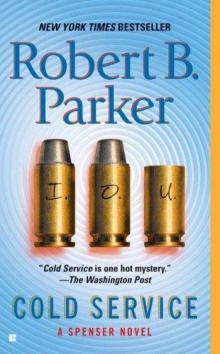 Cold Service
Cold Service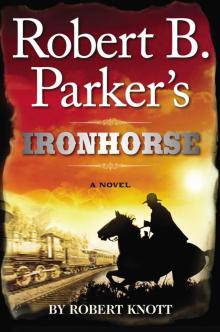 Ironhorse
Ironhorse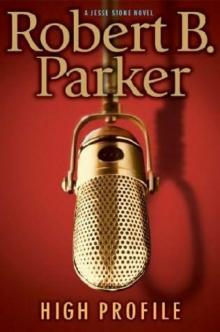 High Profile js-6
High Profile js-6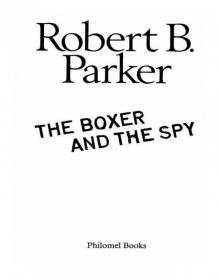 The Boxer and the Spy
The Boxer and the Spy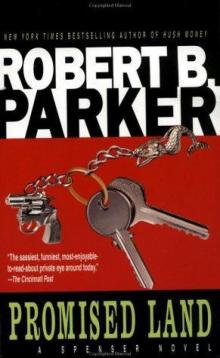 Promised Land s-4
Promised Land s-4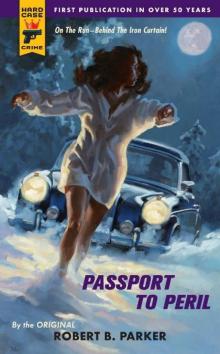 Passport to Peril (Hard Case Crime (Mass Market Paperback))
Passport to Peril (Hard Case Crime (Mass Market Paperback))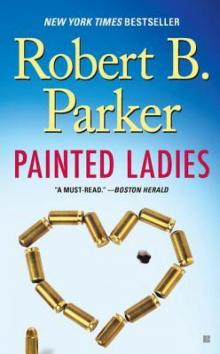 Painted Ladies
Painted Ladies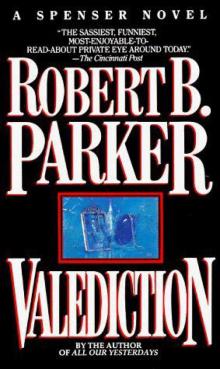 Valediction
Valediction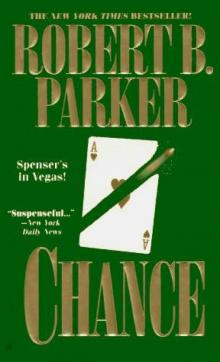 Chance s-23
Chance s-23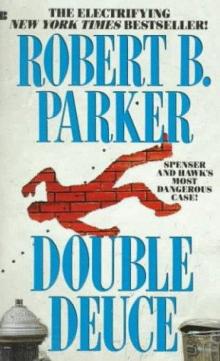 Double Deuce
Double Deuce Wilderness
Wilderness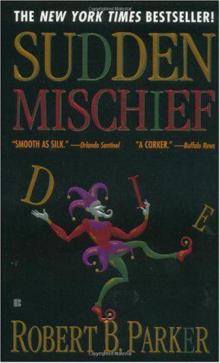 Sudden Mischief
Sudden Mischief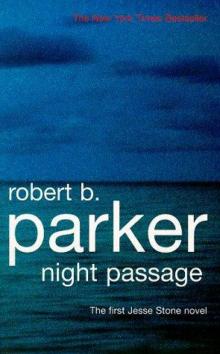 Night Passage js-1
Night Passage js-1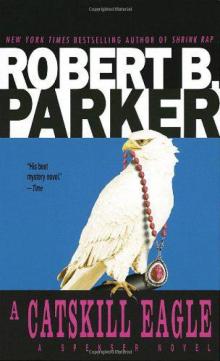 A Catskill Eagle
A Catskill Eagle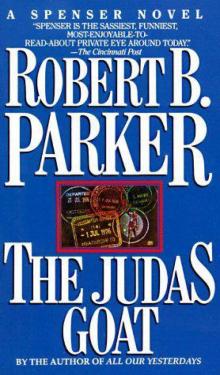 The Judas Goat
The Judas Goat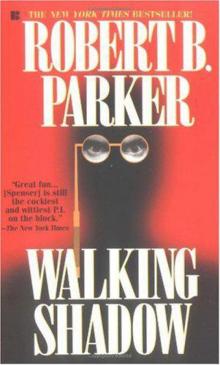 Walking Shadow
Walking Shadow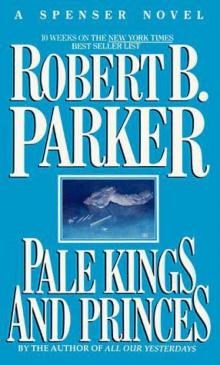 Pale Kings and Princes s-14
Pale Kings and Princes s-14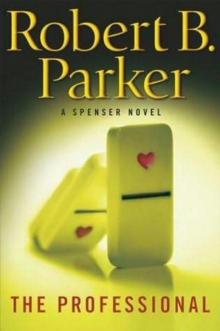 The Professional
The Professional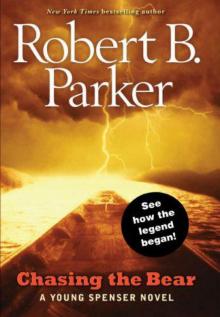 Chasing the Bear s-37
Chasing the Bear s-37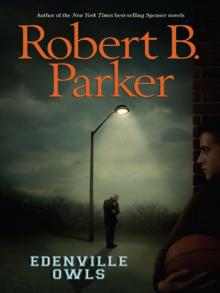 Edenville Owls
Edenville Owls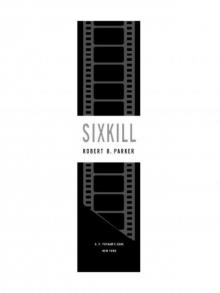 Sixkill
Sixkill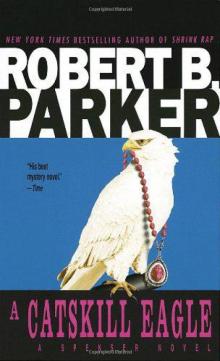 A Catskill Eagle s-12
A Catskill Eagle s-12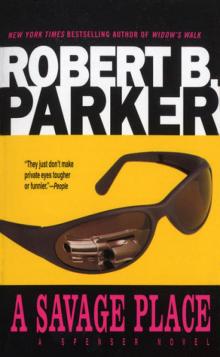 A Savage Place
A Savage Place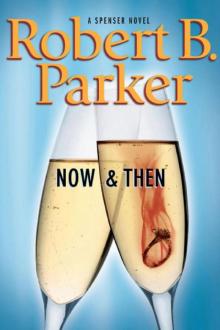 Now and Then s-35
Now and Then s-35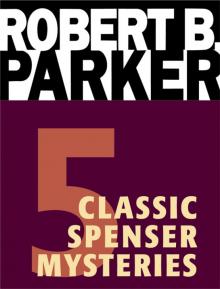 Five Classic Spenser Mysteries
Five Classic Spenser Mysteries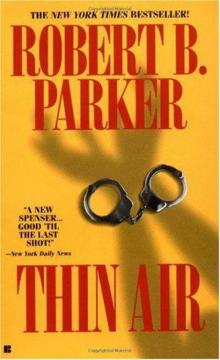 Thin Air s-22
Thin Air s-22